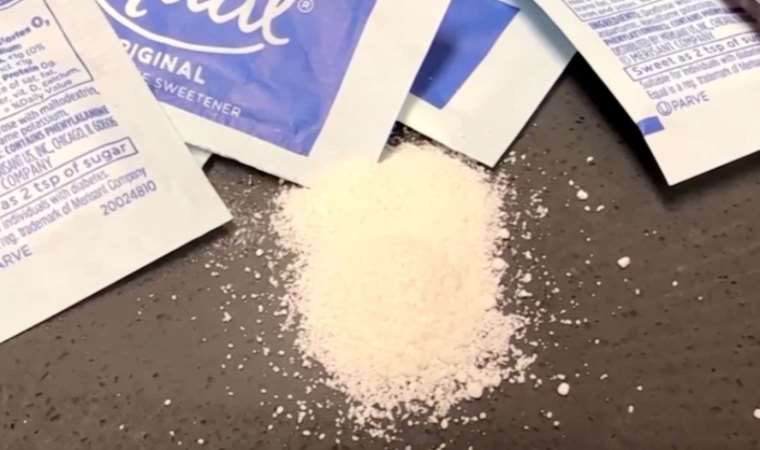The sweetener aspartame is a "possible carcinogen" but it remains safe to consume at already-agreed levels, two groups linked to the World Health Organization (WHO) declared on Friday.
The rulings are the outcome of two separate WHO expert panels, one of which flags whether there is any evidence that a substance is a potential hazard, and the other which assesses how much of a real-life risk that substance actually poses.
Aspartame is one of the world's most popular sweeteners, used in products from Coca-Cola diet sodas to Mars' Extra chewing gum.
In a press conference ahead of the announcement, the WHO's head of nutrition, Francesco Branca, suggested consumers weighing beverage choices consider neither aspartame nor sweetener.
"If consumers are faced with the decision of whether to take cola with sweeteners or one with sugar, I think there should be a third option considered - which is to drink water instead," Branca said.
In its first declaration on the additive, announced early on Friday, the International Agency for Research on Cancer (IARC), based in Lyon, France, said aspartame was a "possible carcinogen".
That classification means there is limited evidence a substance can cause cancer.
It does not take into account how much a person would need to consume to be at risk, which is considered by a separate panel, the WHO and Food and Agriculture Organization (FAO) Joint Committee on Food Additives (JECFA), based in Geneva.
After undertaking its own comprehensive review, JECFA said on Friday that it did not have convincing evidence of harm caused by aspartame, and continued to recommend that people keep their consumption levels of aspartame below 40mg/kg a day.
JECFA first set this level in 1981, and regulators worldwide have similar guidance for their populations.
Several scientists not associated with the reviews said the evidence linking aspartame to cancer is weak. Food and beverage industry associations said the decisions showed aspartame was safe and a good option for people wanting to reduce sugar in their diets.
The WHO said the existing consumption levels meant, for example, that a person weighing 60-70kg would have to drink more than 9-14 cans of soda daily to breach the limit, based on the average aspartame content in the beverages - around 10 times what most people consume.
"Our results do not indicate that occasional consumption could pose a risk to most consumers," said Branca.
LIMITED EVIDENCE
Reuters first reported in June that the IARC would put aspartame in group 2B as a "possible carcinogen" alongside aloe vera extract and traditional Asian pickled vegetables.
The IARC panel said on Friday it had made its ruling based on three studies in humans in the United States and Europe that indicated a link between hepatocellular carcinoma, a form of liver cancer, and sweetener consumption, the first of which was published in 2016.
It said limited evidence from earlier animal studies was also a factor, although the studies in question are controversial. There was also some limited evidence that aspartame has some chemical properties that are linked to cancer, the IARC said.
"In our view, this is really more a call to the research community to try to better clarify and understand the carcinogenic hazard that may or may not be posed by aspartame consumption," said Mary Schubauer-Berigan, acting head of the IARC Monographs programme.
Scientists with no links to the WHO reviews said the evidence that aspartame caused cancer was weak.
"Group 2B is a very conservative classification in that almost any evidence of carcinogenicity, however flawed, will put a chemical in that category or above," said Paul Pharaoh, a cancer epidemiology professor at Cedars Sinai Medical Center in Los Angeles. He said JECFA had concluded there was no "convincing evidence" of harm.
"The general public should not be worried about the risk of cancer associated with a chemical classed as Group 2B by IARC," Pharaoh said.
Nigel Brockton, vice president of research at the American Institute for Cancer Research, said he anticipates research into aspartame will take the form of large, observational studies that account for any intake in aspartame.
Some doctors expressed concern that the new classification of "possible carcinogen" might sway drinkers of diet soda to switch to caloric sugar beverages.
Therese Bevers, medical director of the Cancer Prevention Center at the University of Texas MD Anderson Cancer Center, in Houston, said "the possibility of weight gain and obesity is a much bigger problem and bigger risk factor than aspartame could ever be."
The WHO conclusion "once again affirms that aspartame is safe," said Kate Loatman, executive director of the International Council of Beverage Associations, based in Washington.
"Aspartame, like all low/no calorie sweeteners, when used as part of a balanced diet, provides consumers with choice to reduce sugar intake, a critical public health objective," said Frances Hunt-Wood, secretary general of the Brussels-based International Sweeteners Association.















